If You Really Loved Me Read online
Page 19
And after they all moved to Garden Grove in 1984, a neighbor's driving mishap proved fortuitous for David. An elderly lady next door lost control of her car in her own driveway when she panicked and pressed down on the gas pedal instead of the brake. Her car leapt across the narrow space between the homes and hit below the window on the side of the Brown house—right at the middle bedroom. Although the damage was minimal, David saw a chance to replace the Commodore computer he was using. He wanted an IBM.
"He moved his desk and the old computer out of his office into the room where the house was hit, and then I guess the computer fell on the floor somehow," Patti recalled. "I wasn't there—I didn't see it happen. Anyway, he made it look worse outside, added dirt and stuff." The neighbor's insurance paid off, and David Brown replaced his computer with a state-of-the-art IBM. He explained to Linda and Patti that that was what insurance was designed to do—pay people for their losses.
All along, David was building up his collections. Rare coins. Gold and diamonds. His rings were all custom designed. The phoenix pendant. David also had business cards printed, with a stylized phoenix "guarding" computer banks. He liked the imagery. He retrieved and revived data that seemed to have been hopelessly lost in fires. He helped it to emerge almost unscathed.
David Arnold Brown saw himself in the phoenix. Mr. Magic.
David not only employed his in-laws, he drew his own family members into his business ventures. He boasted that he had taken a brother and a sister "out of ceramics and started them in data retrieval." The data retrieval business fit right in with David's view of family life. Much of it could be done at home.
David claimed to have fielded extremely important phone calls "from the government or some major corporation. The phones rang all day. It might be the Pentagon or Coca-Cola or whoever." He was quick to brag that he was instrumental in rescuing data from some vital projects and businesses. Data Recovery, he told everyone, had reconstructed most of the lost data in the "towering inferno" First Interstate Bank fire in Los Angeles. He loved to describe his role in rescuing dozens of people from almost certain death in the MGM Grand Hotel fire on November 21, 1980. Because the hotel computers were badly damaged in the conflagration, David said the hotel turned to him for help. Within two hours, he was able to reconstruct its files. This was vital, he pointed out, because the files were the only way to show which rooms had occupants and which were vacant. "I was instrumental in saving the lives of one hundred and twelve hotel guests by directing rescue efforts in Las Vegas—while I was in California. They went directly to the rooms with people in them and didn't waste time on the empty rooms." Despite David's alleged role in the rescue attempts, eighty people did perish in the MGM Grand fire.
When the San Diego blood bank was also hit by fire, David said he was able to restore its computer network so that blood bank employees could trace blood units desperately needed in southern California hospitals.
And then there was the Coca-Cola Company. "Linda and I weren't supposed to fly together," David explained. "The Coca-Cola Company wouldn't allow it. If we were both killed, they'd be in deep trouble. They even called us Mr. and Mrs. Coca-Cola! We were that vital to them. But we didn't care what they said. Neither Linda nor I thought we could go on without the other. If we went down, we wanted to go down together."
The boy who never got past the eighth grade was the man who proudly boasted of being referred to in both People and Time. "I'm known as the 'Red Adair of the computer industry.'" It was he, and his particular skill and talent, David bragged, who unlocked the tragic puzzle of the explosion of the Challenger space shuttle on January 28, 1986. "I worked for two days with NASA and the Department of Defense to find the cause of the explosion," David explained in his deep baritone. "I was able to prove that the crew members were killed instantaneously—I could guarantee they didn't suffer."
This claim, at least, was an outright lie. But few people questioned David Brown and his skill; he had a convincing way about him and he talked computerese like an expert. He was making money and he was sought after in the data retrieval industry. Who could say how many of his stories were true and how many were gross exaggerations?
Whatever the truth, by 1984, business was booming. Patti and Linda folded and stuffed envelopes. They took turns typing. Phones in the house were all on speakers so David could talk to his many clients from every room without having to pick up the phone. That way everyone in the family could keep up with which orders were coming in. There were no secrets in the business, not among the three of them.
Or so it seemed.
Had Cinnamon Darlene Brown been a jealous child, she might have had good reason to feel she was odd child out in her parents' lives. She was always being shuttled back and forth, and she had no sense of permanency. If she was even a half hour late getting home, her mother would sometimes call her father and demand he come and get Cinnamon. She was a pawn used for threats and revenge.
Cinny loved both her parents, but her father had Linda and Patti; her mother was remarried—to Tracy Sands, a man a few years younger than she—and had given birth to a second daughter. Cinnamon's stepfather was a struggling musician, and much of the attention in Brenda's house in Anaheim was given either to Tracy's career ambitions, or to the new baby girl, Penelope.
Cinnamon, however, loved her half sister, just as she greeted the news that Linda was pregnant with happy excitement. Linda was due to deliver in July of 1984. There would be almost exactly fourteen years between children for David. Cinnamon had been born to poor teenage parents; David was now in a financial position to give this expected baby everything. The preparations for the birth rivaled those for a royal offspring. The family had settled into the rental house on Ocean Breeze Drive in Garden Grove by 1984, and there was room for everyone—the master bedroom for David and Linda, the large front bedroom for Patti, and the middle room as a nursery.
Room for everyone but Cinnamon.
Every minute that she wasn't working with David or cooking or cleaning, Linda spent fixing up the middle bedroom for a nursery. David let her buy anything she wanted for the baby. She got the nicest crib, the kind that could be turned into a youth bed later, and matching chests and a little chair swing that moved automatically and played music too. It made Linda happy to know that her baby would have all the things she had never had.
Still there were clouds over her bliss. Even though she was thrilled about her pregnancy, the final months were difficult for Linda Brown. She felt fat and awkward in the heat of a southern California summer. She wore smocks and shorts with elastic panels and her feet swelled. That same summer, her sister Patti, who had the perfect figure that only a well-endowed sixteen-year-old can have, looked exquisite in shorts and halter tops.
For the first time, Patti's obvious crush on David niggled at Linda. She wasn't a kid anymore, and Linda's patience was wearing thin. Patti was so transparent in the way she looked at David. He could do no wrong in her eyes, and Linda felt a shiver of fear as she watched Patti's adolescent attempts at being seductive. She had been there herself— with David—and not so long ago.
Linda was used to going everywhere with David, and he had always bragged, "I won't go to work without Linda." Now, there were days that David did go to work without Linda; sometimes, he even took Patti with him. He was training Alan in The Process too, since the baby would require so much of Linda's time. She couldn't feel bad about that; it was her idea. Even so, Linda felt her closeness with David evaporating.
Friends who spoke to Linda on the phone that July recall that she sounded depressed and unhappy. Her mother, Ethel, knew that Linda wanted Patti to move back home. Linda mentioned it to her several times, but David always refused to let Patti leave.
Linda and Patti seemed to be getting along better by the time Linda gave birth to Krystal Marie on July 20, 1984. Everybody loved that baby and took turns taking care of her. After Krystal's birth, Linda had a lovely baby shower. Even Brenda attended, and Linda seemed happy a
nd thrilled about her baby.
David was just crazy about Krystal and didn't mind at all that he hadn't had a son. He played with the baby and rocked her and tickled her. He would brag later, "That little girl loves me. I had her laughing from the day she was born." He took pictures of Linda and their new baby and hung them in his office.
Linda put her jealousy over Patti down to plain old pregnancy blues. Now, as far as anyone could tell, everything was fine with the family. If problems remained, Linda never mentioned them. Only a few weeks before she died, she had stopped over in Riverside at Mary and Rick Bailey's house after visiting a friend. She had both Patti and Cinnamon with her, and Mary saw nothing but harmony.
Brenda Brown Sands, however, saw things that troubled her. "I wanted to have Cinnamon baptized and David said no. He said he'd drag her out of the church if I did that. I needed her birth certificate, and it was in David's safe. Linda said she'd look for it while David was gone. She said, 'I'm scared—but I'll do it.' Well, she had the safe open and I heard her gasp and say, 'Oh, my God, he's coming in the door!' Believe me, she was afraid of him!"
A few weeks later, Brenda saw Linda and Patti at the Department of Motor Vehicles and noticed how sad and tired Linda looked. "I wanted to just go over and tell her, 'Leave him—things are not right.'"
When school started in September 1984, Cinnamon moved back into her father's house. Linda explained to Mary Bailey, "I took her aside before any decision was made. I told her, This will be the last time, Cinnamon. No more moving in and out. If you want to live with us, that's fine—but you'll have to go by our family's rules.' She took it just fine."
Cinnamon had no problem with that. She moved in with David and Linda in time to start school at Bolsa Grande High in Garden Grove. She and Patti both went there. And Patti shared her room with Cinnamon. Patti had the white iron daybed next to the wall, and Cinny slept on the trundle bed that pulled out.
Neither of the girls had many friends among their peers. Patti sometimes talked to a girl who lived across the street, and they both liked Betsy Stubbs, whose father, Al, was David's insurance agent. Betsy was plain and not the smartest girl in the world, but Cinnamon thought she was a riot because she coined original phrases that sent Cinny into gales of laughter. "Neat things like calling people 'Sheep Dip' or she'd yell, "Oh, you rowdy poopster!' " Patti could never see the humor in it, but Betsy broke Cinnamon up. They saw Betsy quite a bit because David had a lot of insurance business, and the girls often rode along with him. David didn't care for most of their friends, but he liked Betsy.
Still, basically, David had only his family. Just David and four females: Linda, Patti, Cinnamon, and now, Krystal. Later, one of David Brown's detractors would liken his living situation to "his own little fiefdom." In a sense, the characterization was apt: "an estate in land held from a lord on condition of homage and service."
Everyone danced to David's tunes.
Even with all of them living so close together, sharing meals, sharing evenings in front of the television, sharing outings up to the Calico Mountains, and working in Data Recovery together, there were a number of secrets in the Brown household in Garden Grove. Cinnamon stumbled across one of them in late January 1985.
The family stopped at a K mart to make a purchase. David, Patti, and Cinnamon went in to shop, leaving Linda with Krystal in the van; Krystal needed a diaper change, and Linda told them to go on in to shop without her. She arranged a blanket on the tailgate so she could change the baby.
Cinny headed for the stereo tapes, vaguely aware of her father and Patti as they walked toward the clothing department. When she found the tape she wanted, she hurried to find them. Cinnamon turned the corner around a rack of dresses, then stopped, feeling icy shock wash over her. Here, back in a far corner of the sprawling store, her father was kissing Patti. Not a friendly kiss or a fatherly kiss, but an intimate, passionate kiss. Cinnamon watched, her feet frozen to the spot where she stood, unable to believe what she saw.
"I stared. ... I couldn't breathe that well. I was in shock. ... I was all—oh, no, something's wrong here! . . . They were holding each other ... I thought I was going crazy or something.
"Then my father turned quickly, and he looked at me," Cinnamon remembered. "I ran across the store and he chased me. He goes, 'Cinny, Cinny! What's wrong? What's wrong?' And I said, 'I saw you!' And he goes, 'What did you see?' and I told him, 'I saw you kissing Patti.' And he goes, 'I'm sorry you had to see that. Kissing Patti was an accident.' "
Cinnamon's head buzzed. How could he have kissed Patti by accident? She darted a look at the parking lot and was relieved to see Linda was still standing out by the van. Stunned and confused, she began to cry. "Are you trying to drive me crazy?" she asked. "I don't understand." Her father was asking her to forgive him, but she didn't want to talk to him. She ran away and huddled, shaking, at a counter where he couldn't see her.
After a long time, Linda found her and was alarmed at how distraught Cinnamon looked. "What's wrong with you?" she asked.
"Nothing," Cinnamon lied, "I'll be all right."
Cinnamon was silent as they paid for their purchases. She couldn't tell Linda what she had seen. "At the time I was scared of my father. Otherwise I would have been assertive and told Linda."
It made her feel especially bad because Linda was so concerned about her. She moved back in the van to sit by Cinnamon and tried to find out why she was so upset. Linda seemed to think that Cinnamon had wanted to buy something and hadn't had money. Cinnamon turned her face to the window and shook her head. Linda had no idea how bad it really was.
"When we got home, my father stopped me by the front door and he goes, 'Don't tell anybody about what you saw in the store. It's very important to me.' "
She promised him she would say nothing.
"Okay, fine. I'll respect that," David said.
Cinnamon ran out to the little trailer in the backyard. She didn't want supper, and she certainly didn't want to talk to her father. "I didn't know how to deal with him." But David came out and pounded on the door until she let him in. He tried to explain to her that what she had seen wasn't anything special. "Sometimes, these things happen."
"I don't want to talk about it."
"It wasn't anything, Cinnamon."
"I don't want to talk about it."
But she thought about it. All night long. It made her sick to her stomach and she didn't want to eat, although Linda came and tapped on the trailer door and tried to coax her into the house for supper.
How could her daddy kiss someone almost as young as she was like that? How could he do that to Linda? She didn't care what he said. It wasn't supposed to be like that. And she didn't believe it was an accident. Thinking about it just made her more confused.
Cinnamon finally fell asleep in the trailer, but she had nightmares, seeing her father and Patti kissing over and over.
17
Having temporarily exhausted his list of relatives, ex-relatives, ex-wives, and acquaintances who had things to say about David Arnold Brown, Jay Newell took another tack. As any other private citizen could have done had he been curious, he began to keep track of Brown by checking public records. It wasn't easy. The usual paper trail left when people move—mail forwarding, disconnection of gas, electricity, and water—was no help.
After David Brown moved out of the rental on Breckenridge, Newell lost the scent. All refunds and mail had been directed to Arthur Brown's Carson address. But that house seemed shuttered and empty, as if David's parents were gone too. Newell was sure that Brown was still in the Orange County area—but where?
Because he had a relative in the real estate business, Newell was more savvy than most in checking property transfers. He found one item that fascinated him. Within three weeks of Cinnamon Brown's murder conviction, David Brown had purchased a new home. Real estate transaction records in the courthouse indicated that David Arnold Brown had purchased a home on August 30, 1985. He had received a grant deed—paid in full
—on a house selling for $330,000.
Newell went looking for it and found it easily. And what a house it was—in a most exclusive area of Orange County: Anaheim Hills. Brown had purchased one of the most lavish houses in the new subdivision called Summit View. All the homes there are set along hilly, curving streets—most of them with names ending in ridge. The name was apt; at the top of Summitridge Lane, the view of the Santiago Canyon far below is breathtaking.
The street was so new in 1985 that all its trees were staked and spindly, but begonias, petunias, gerbera daisies, and the fragrant wild plum with its tiny five-petaled white-star flowerets had already taken hold in most yards. All utilities were discreetly underground. Ironically, four huge high-powered electrical towers perched almost malevolently at the very top of the hill. The surging power beneath the ground had to come from somewhere, and a dozen high tension wires hummed as they stretched from tower to tower along the hill's spine.
The house at 3823 Summitridge Lane was clearly that of a rich man, a 1980s version of what an "olde English country manor" might look like if it were relocated from Stratford-on-Avon to Orange County. Fieldstone and stucco with crossbeams, shake roof, leaded windows, a recessed entry-way with massive double doors.
A dream house on a dream street.
Each house on Summitridge Lane was grander than the next; every lawn manicured and boasting a huge stone or brick planter that matched the house's facade. Housing codes obviously dictated that even the mailboxes were to be enclosed in stone or brick stanchions, and each also matched its house perfectly.
Of course the house on Summitridge Lane had a triple garage. The balconies in the rear of Brown's new house overlooked the azure swimming pool, and the attached hot tub. Twin hexagonal, two-story towers abutted the pool. There were two weathered-brick barbecues, and the fence surrounding the backyard was of the same brick and wrought iron.

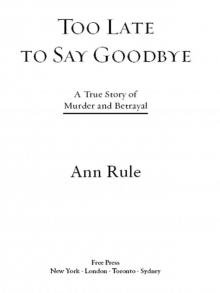 Too Late to Say Goodbye: A True Story of Murder and Betrayal
Too Late to Say Goodbye: A True Story of Murder and Betrayal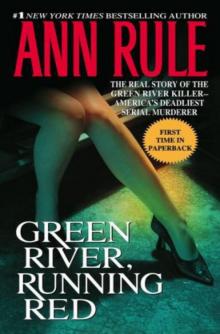 Green River, Running Red
Green River, Running Red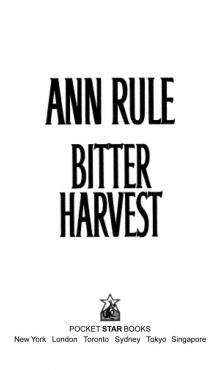 Bitter Harvest
Bitter Harvest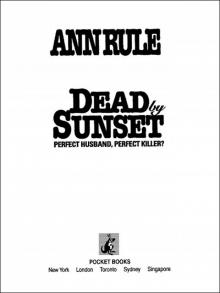 Dead by Sunset: Perfect Husband, Perfect Killer?
Dead by Sunset: Perfect Husband, Perfect Killer?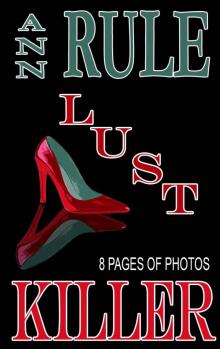 Lust Killer
Lust Killer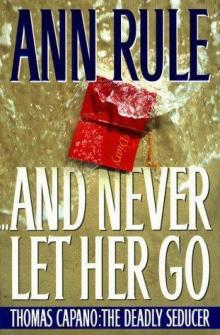 And Never Let Her Go: Thomas Capano: The Deadly Seducer
And Never Let Her Go: Thomas Capano: The Deadly Seducer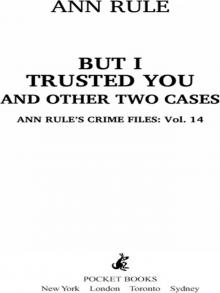 But I Trusted You and Other True Cases
But I Trusted You and Other True Cases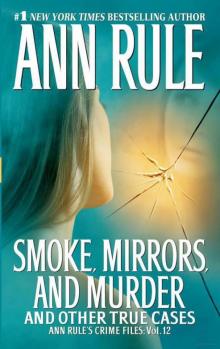 Smoke, Mirrors, and Murder and Other True Cases
Smoke, Mirrors, and Murder and Other True Cases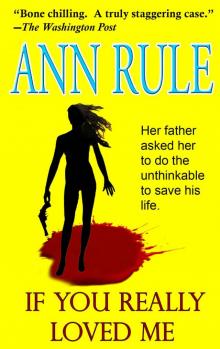 If You Really Loved Me
If You Really Loved Me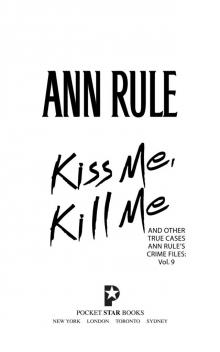 Kiss Me, Kill Me and Other True Cases
Kiss Me, Kill Me and Other True Cases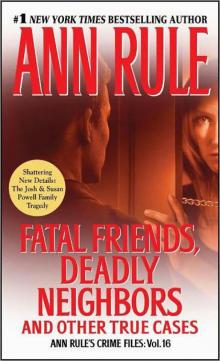 Fatal Friends, Deadly Neighbors and Other True Cases
Fatal Friends, Deadly Neighbors and Other True Cases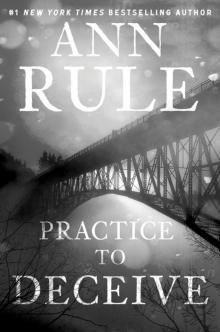 Practice to Deceive
Practice to Deceive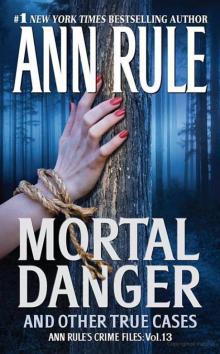 Mortal Danger and Other True Cases
Mortal Danger and Other True Cases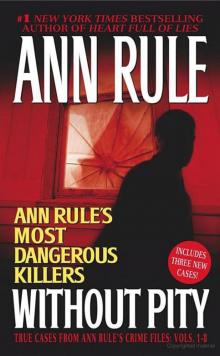 Without Pity: Ann Rule's Most Dangerous Killers
Without Pity: Ann Rule's Most Dangerous Killers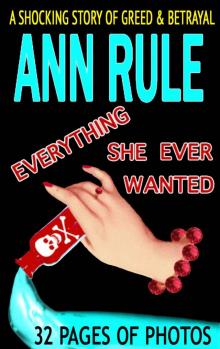 Everything She Ever Wanted
Everything She Ever Wanted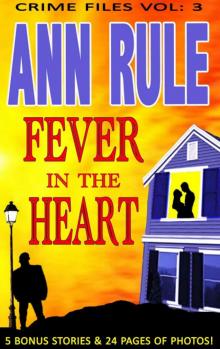 A Fever in the Heart and Other True Cases
A Fever in the Heart and Other True Cases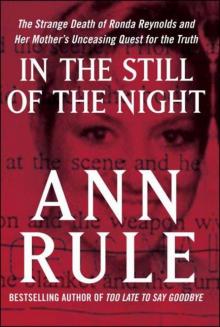 In the Still of the Night
In the Still of the Night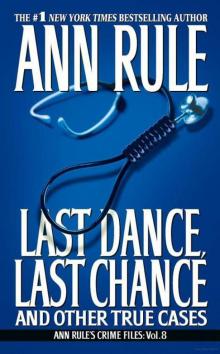 LAST DANCE, LAST CHANCE - and Other True Cases
LAST DANCE, LAST CHANCE - and Other True Cases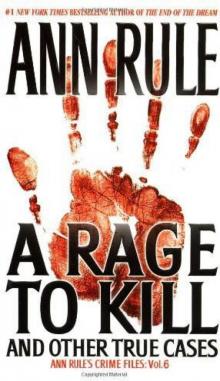 A Rage to Kill
A Rage to Kill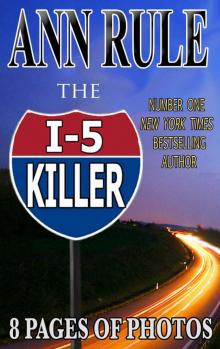 The I-5 Killer
The I-5 Killer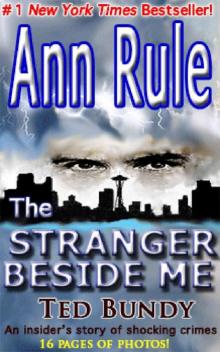 The Stranger Beside Me
The Stranger Beside Me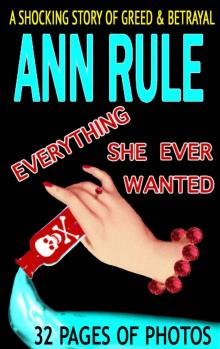 Everything She Ever Wanted: A True Story of Obsessive Love, Murder, and Betrayal
Everything She Ever Wanted: A True Story of Obsessive Love, Murder, and Betrayal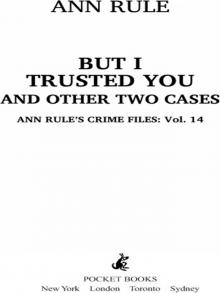 But I Trusted You
But I Trusted You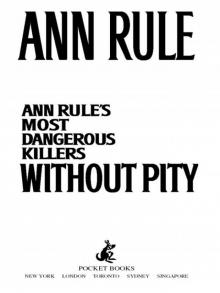 Without Pity
Without Pity Kiss Me, Kill Me
Kiss Me, Kill Me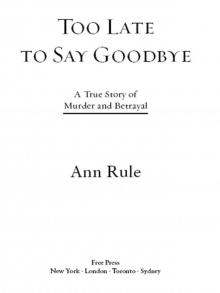 Too Late to Say Goodbye
Too Late to Say Goodbye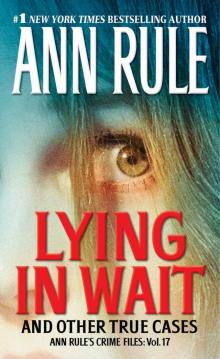 Lying in Wait
Lying in Wait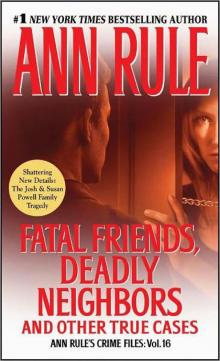 Fatal Friends, Deadly Neighbors
Fatal Friends, Deadly Neighbors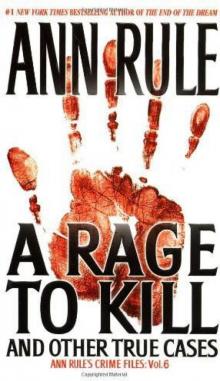 A Rage to Kill: And Other True Cases
A Rage to Kill: And Other True Cases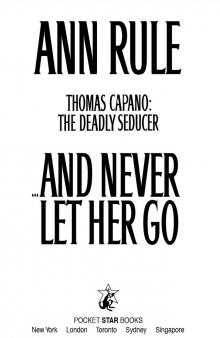 And Never Let Her Go
And Never Let Her Go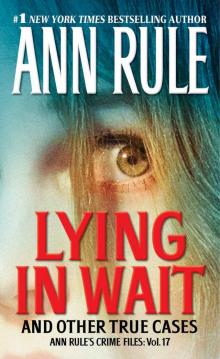 Lying in Wait Ann Rule's Crime Files Vol.17
Lying in Wait Ann Rule's Crime Files Vol.17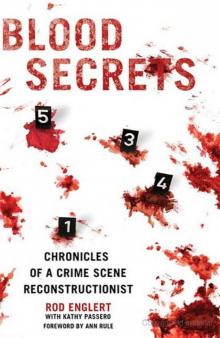 Blood Secrets: Chronicles of a Crime Scene Reconstructionist
Blood Secrets: Chronicles of a Crime Scene Reconstructionist No Regrets
No Regrets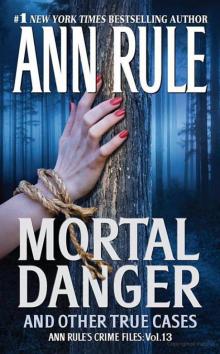 Mortal Danger
Mortal Danger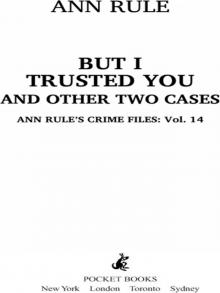 But I Trusted You: Ann Rule's Crime Files #14
But I Trusted You: Ann Rule's Crime Files #14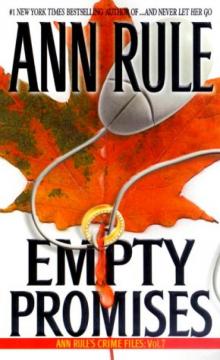 Empty Promises
Empty Promises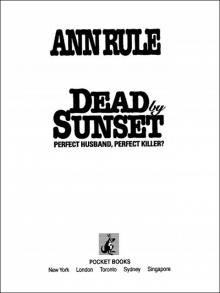 Dead by Sunset
Dead by Sunset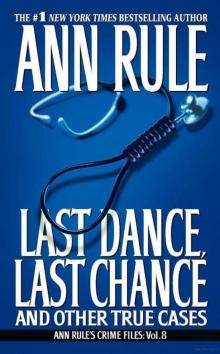 Last Dance, Last Chance
Last Dance, Last Chance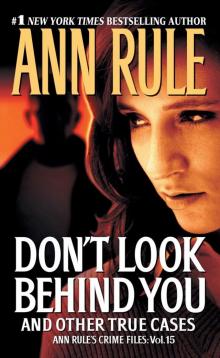 Don't Look Behind You
Don't Look Behind You